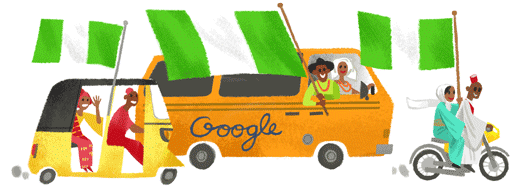
Over the years, Google’s Doodles have become popular especially during events of significant importance across the world. In Africa, Doodles are regularly released to commemorate significant days in Africa’s history.
In May, Kenya hosted Google’s Doodle 4 exhibition; Doodles had been designed to celebrate notable national days in Africa such as the general elections in South Africa and Kenya; and Uganda’s last Independence Day.
Furthermore, Doodles are regularly used to honour living and dead African personalities including Miriam Makeba and Wangari Maathai.
For Nigeria’s 2014 Independence Day, Google decided to go with a Doodle designed around the major uniquely Nigerian forms of road transport – the motorcycle, tricycle popular called Keke NAPEP and a commercial bus. Each had someone waving the flag of Nigeria; the motorcycle and tricycle were also releasing fumes that are unfriendly to the environment especially the ozone layer.
A closer look at the Doodle revealed one of the major stereotypes that continue to linger on in Nigeria’s tech industry, it is the mindset that Lagos is Nigeria.
It’s only in Lagos state that the yellow buses are operating. In Abuja, the buses are painted green, in Ibadan, brown is the colour. Several other states have their unique colours. The Doodle would have been more visually appealing if the bus was painted green but considering the fact that Lagos is most popular, the colour scheme in the state was chosen to represent the entire country.
This is the familiar story in Nigeria’s tech industry as startups and multinational companies tend to focus more on the Lagos market, spreading sparingly to other parts of the country thus making other Nigerian states to eat the crumbs falling off Lagos’ table.
The population of Lagos is understandably attractive to tech companies in addition to other available infrastructures. But there is the need to put more parts of Nigeria on the tech scene and to distribute investments in the nation’s tech sector across the major geopolitical zones.
Considering the dynamics of Lagos, it is believed that several failed startups may have succeeded if they had commenced operations in other parts of the country where there was no competitor/alternative and the cost of running the business lower compared to Lagos.
Telecoms company Smile Communications is a good example of a company that began operations from outside Lagos (Ibadan to be specific) and recorded phenomenal success, before spreading to Lagos and other cities in Nigeria.
As earlier stated in a similar opinion piece, tech in Nigeria should not be all about Lagos. Stakeholders should strive to repeat the Lagos tech success story in other parts of Nigeria.
About a year ago, Ademola Morebise, a Nigerian innovator and entrepreneur told HumanIPO that attention would soon shift away from Lagos but in the taxi app sub-sector for instance, several companies such as Uber, Easy Taxi, AfroCab and others are competing for the Lagos market, none is operating in any of the neighbouring cities.
Therefore, Nigeria cannot claim to be totally independent if 35 states have to depend on a state that is not even the federal capital for tech leftovers, and the world’s largest search engine Google is ‘unknowingly’ portraying Lagos as Nigeria.













